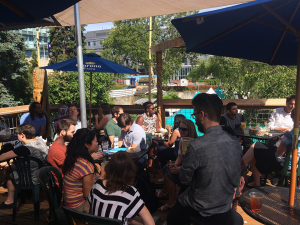
The 16 Data Science for Social Good student researchers (selected from among 140 applicants) join eScience Institute staff to kick off the “Social” part at Agua Verde on afternoon one of the summer-long program.
UW’s eScience Institute, led by CSE faculty members Bill Howe and Ed Lazowska, kicked off its new summer program, Data Science for Social Good, this week. Focusing on the theme of urban science, the program enables teams of students, faculty and community stakeholders to tap into eScience members’ expertise and powerful data analysis and visualization tools to address issues affecting urban environments, including public health and safety, sustainability, transportation, education and social justice.
Two participating projects have connections to UW CSE’s Taskar Center for Accessible Technology: Open Sidewalk Graph for Accessible Trip Planning, or Access Map, an award-winning online tool developed by UW students under the guidance of CSE’s Alan Borning and Anat Caspi that enables people with limited mobility to plan an accessible route through the city; and ParaTransit To Go, a project led by Caspi to improve the quality of King County Metro Paratransit services for passengers with disabilities in King County while making those services more cost-effective to operate.
 In addition to the accessibility projects, the DSSG accepted two other proposals aimed at improving urban communities: Assessing Community Well-Being Through Open Data and Social Media, a project by Third Place Technologies which leverages social media and open data sources to identify emerging issues in neighborhoods, with a focus on underserved communities; and Predictors of Permanent Housing for Homeless Families in King, Snohomish & Pierce County, a project of the Bill & Melinda Gates Foundation which aims to identify the factors that contribute to homelessness and the barriers to families finding permanent housing in order to better prioritize resources and reduce local families’ need for temporary shelter.
In addition to the accessibility projects, the DSSG accepted two other proposals aimed at improving urban communities: Assessing Community Well-Being Through Open Data and Social Media, a project by Third Place Technologies which leverages social media and open data sources to identify emerging issues in neighborhoods, with a focus on underserved communities; and Predictors of Permanent Housing for Homeless Families in King, Snohomish & Pierce County, a project of the Bill & Melinda Gates Foundation which aims to identify the factors that contribute to homelessness and the barriers to families finding permanent housing in order to better prioritize resources and reduce local families’ need for temporary shelter.
Read more about Data Science for Social Good here, and find more information about the participating projects here.
Read past blog coverage of the participating Taskar Center projects here.

